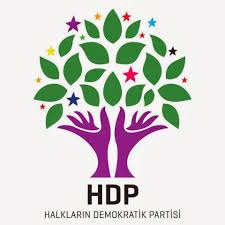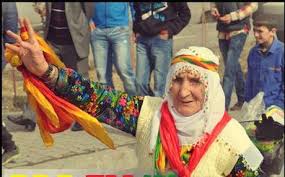Kurds and Women are new force in Turkey’s election
Turkey’s general election on Sunday 7 June will have historic implications for the country’s 15 million Kurds. Will they finally be represented by a national political party rather than just winning a few seats as independents? Kurds form the country’s largest ethnic minority at around 20% of the population and growing, thanks to their high birth rate.
No one doubts that the AK (Justice and Development) party of President Erdogan which has been in power since 2002 will remain the largest party. Polls indicate it will gain about 40% of the vote, but that is down from nearly 50% in the 2011 elections.
The game-changer this time is a newly formed group of pro-Kurdish and pro-minority rights parties which has come together to fight the elections under the banner of the HDP (People’s Democratic Party).
It is an all or nothing gamble that by banding together, they will cross the 10% threshold needed to gain seats in parliament. If they fail, they lose everything. Worse still, their votes will be redistributed and AK will be the main beneficiary, paving the way for Erdogan to award himself greater presidential powers.
The HDP is seen as Turkey’s equivalent of Greece’s Syriza and Spain’s Podemos, and their charismatic leader Selhattin Demirtas, a 42-year old human rights lawyer, has oratorial skills to rival Erdogan’s and looks that exceed his.
He must win votes from Erdogan’s traditional AK supporters in order to succeed. His appeal, to judge from the crowds at his election rallies, is broad, with enthusiastic young Kurds and secular Turks, women both headscarved and not.
His new party supports Turkey’s membership in the European Union, is calling for the PKK (the Kurdish separatists) to disarm, supports gays and same sex marriage and wants Turkey to recognise the Armenian Genocide. The party’s aim is to end all discrimination based on gender, race or religion. As Turkey’s only party championing minority rights, the HDP is gaining support from Syriac Christians, Kurds and Alevis. In another exceptional difference from Turkey’s male-dominated parties, they have an automatic policy of sharing all top positions with women, seeking to promote the involvement of women in politics. As acclaimed Turkish novelist Elif Shafak put it: “Once seen by Turkish nationalists as a backward subculture, the Kurds are now Turkey’s leading progressive force.”
Erdogan in his presidential role is supposed to be apolitical though no one would have guessed it. His electoral rallies are unashamedly pro his own AK party which has triumphed repeatedly in the polls since he became its leader. But his current aspirations to change Turkey’s constitution to a presidential style system similar to that of France may yet be his undoing, as his hubris seems to have overstepped the mark. His excesses are well-publicised, from his grandiose 1,100-room White Palace in Ankara to the ‘toilet-gate’ affair over the alleged golden toilet seats installed at public expense. Corruption allegations are increasing and Turkey now ranks 149 out of 180 in the Corruption Perception Index, even worse than Russia.
In spite of such criticisms, Erdogan remains hugely popular especially east of Ankara in the traditional and religiously conservative Anatolian heartlands. His economic policies have brought increased prosperity through vast investment in infrastructure projects like new roads and the high-speed train to cities like Konya. His encouragement of the headscarf has come as a ‘liberation’ to many women in eastern Anatolia who say they now feel more comfortable and respected.
But it is in these southeastern regions, where most of Turkey’s Kurds are concentrated, that Erdogan’s popularity is being challenged in this election.
Turkey’s spectacular growth of the last decade has given way to stagnation and high unemployment. Erdogan’s foreign policies have backfired leaving the Kurdish peace process dangling by a thread and his country overrun with two million Syrian refugees. In his recent rallies in the big eastern cities, some women are quite literally turning their backs on him in symbolic protest.
Turkey has the lowest female employment in the OECD, less than 30%, going backwards from over 40% in the 1980s.The AK party is still only fielding 18% women candidates in this election, and although that represents a rise from 14% in 2011, in practice women are totally absent in nearly half of Turkey’s 81 provinces and only occupy the top position in four of them.
Public turnout in recent elections has been over 80% and the importance of this election may see that figure rise, as more women come forward to vote. A sophisticated young Turkish graduate from Ankara now working in Mardin told me how impressed she was by the non-discriminatory policies of HDP, in power locally since 2014. “I will be voting for them,” she told me. “I think they are the future.”
Turkey’s electoral battle this Sunday hinges on many things – economics, religion, Kurdish and minority rights to name just a few. Maybe for the first time it is also about women. The choices made by Turkey’s women, be they Kurds or otherwise, may even determine the outcome.
Related articles:
http://www.bbc.co.uk/news/world-europe-32950750
http://www.alaraby.co.uk/english/news/2015/6/7/turkey-votes-in-high-stakes-elections










![Kurds on the Turkish borber, supporting their fellow Kurds battling for Kobane, Syria [October 2014]](https://dianadarke.com/wp-content/uploads/2014/10/kobane-kurds-on-turkish-side-oct-2014-_78284326_d9396def-f39b-40ec-bd44-0eaf58330353.jpg?w=300&h=168)